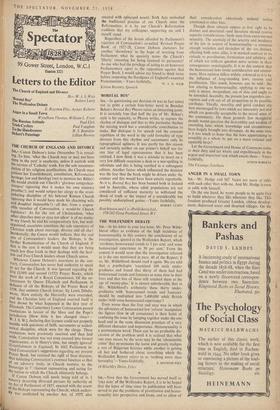Letters to the Editor
The Church of England and Divorce Rev. W. J. S. Weir !Borstal Boy' Robert Lusty The Wolfenden Debate E. Royston Pike, Apple,. Roberts Anger in a Small Town • Wyndham Thomas. William L. Fryer The Russian Attitude Paul Elek Trick-Cyclists Paul Vaughan. To the Hairdressers H. S. Beardow Sickert's Paintings Lillian Browse
THE CHURCH OF ENGLAND AND DIVORCE Slit,---Canon Dobson's letter (November 7) is reveal- ing. To him, `what the Church may or may not have done in the past' is anathema, unless it accords with his version of 'Catholic' truth. For the sole accommo- dation of his religious predilections, the Church must Jettison her Establishment, constitution, Reformation heritage, law and theology (not to mention her Bible)! 11.[e would abolish our Church's 'glorious comprehen- siveness' (ignoring that it makes his own ministry possible!), and would subject her clergy to the strait- lacketing discipline of his beloved Roman Church (Ignoring that it would have made his charming wife and daughter impossible !)—all this, from a respon- sible member of Convocation, a would-be Church legislator ! As for the rest of Christendom, 'what other churches may or may not allow' is of no matter to my friend; he and his comparatively few, but well- organised, associates constitute the sole repository of Christian truth about marriage, divorce and all else! Incidentally, the Canon would indicate that the real aim of Convocation's leaders, the Bishops, is the further Romanisation of the Church of England. If that is the case it would seem that they are being Much less than frank in their dealings with the Scot- tish and Free Church leaders about Church union.
Whatever Canon Dobson's assertions to the con- trary, Convocation has never had authority to speak or act for the Church. It was ignored regarding the first (1549) and second (1552) Prayer Books, which Were the work of a Royal Commission. Of the en- forcement by Queen Elizabeth and Parliament, in defiance of all the Bishops, of the Prayer Book of 1558, that eminent Church lawyer, Si Lewis Dibdin. wrote, 'How entirely the Hierarchy were overruled, and the Christian laity of England asserted itself is best shown by what happened in the first year of Elizabeth. The Canterbury Lower Convocation passed resolutions in favour of the Mass and the Pope's Jurisdiction [How little it has changed since!— W. J. S. W.], declaring that laymen could not properly Meddle with questions of faith, sacraments or ecclesi- astical discipline, which were for the clergy. These resolutions were graciously received and then laid aside. Convocation was not even coerced into formal acquiescence, as in Henry's time, but simply ignored' (stablishment in England). In 1662 Parliament in- vited Convocation's suggestions regarding our present Prayer Book, but retained the right of final decision; thus initiating Convocation's eventual ftinction as that of an advisory body, -in Church matters, to the Sovereign in r Iliament representing and acting for the nation to which the Church ultimately belongs. If Canon Dobson still needs being told of it, I remarry deserving divorced persons by authority of an Act of Parliament of 1857, enacted with the assent of the Bishops representing the Church; which author- ity Was confirmed by another Act, of 1937, also enacted with episcopal assent. Both Acts embodied the traditional practice of our Church since the Reformation; it is by our Church's Reformation tradition that my colleagues supporting me and I myself stand.
Regardless of the lesson afforded by Parliament's rejection of Convocation's so-called 'Revised Prayer Book' of 1927-28, Canon Dobson clamours for another 'showdown' in the hope of wresting from Parliament what he quaintly terms the Church's 'liberty' (meaning his being licensed to persecute)! As one who had the privilege of acting as an honorary Parliamentary agent to the opposition against that Prayer Book, I would advise my friend to think twice before reopening the floodgates of England's essential Protestantism.—Yours faithfully,
W. J. S. WEIR
Kirton Rectory, Ipswich














































































 Previous page
Previous page